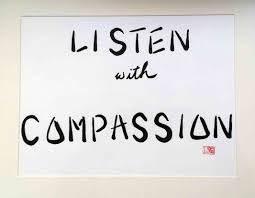How we act when confronted with significant disruption – fear, anger, loss and grief — influences the long term health and resilience of both individuals and groups. Consider how responding with compassion leads to new patterns of actions and reactions in the face of disruptive experiences. Dr. Helen Weng, Assistant Professor of Psychiatry at the University of California–San Francisco, with faculty appointments at the Osher Center for Integrative Medicine and Neuroscape Center led a team of researchers at the University of Wisconsin who studied the development of compassionate thinking in adults.

An additional exercise after the training, included having all participants play a money game, which tested their willingness to be generous with a partner. The participants who had the loving kindness meditation were more generous. Dr. Weng suggested the compassion meditation exercise seemed to strengthen emotional regulation and encourage participants to help others. Those who had reappraisal training were also sensitive to suffering, but more likely to want to decrease their own discomfort when they saw it, making them less inclined to be generous.
Developing compassion in children has been the focus of numerous classroom based strategies. Martha Caldwell, a teacher at the Paideia School in Atlanta, GA, and an author tells how she teaches her students the art of compassionate listening. Ms. Caldwell is also a teaching consultant for the Social, Emotional and Ethical Development (SEEd) program at Emory University. Real attentive listening-not just being quiet or holding your breath waiting for your turn to speak-it helps students feel calm, accepted, trusting, and open to learning, Ms. Caldwell writes at greatergood.berkeley.edu. She helps students identify the guidelines they need to feel safe and respected in class.
 A shining example of how to act with compassion is found in the March For Our Lives movement, which is inspired by and led by the young people who are most deeply affected by violence. A simple statement in their mission statement, our “young voices will be heard,” offers each of us an opportunity to listen and react with compassion.
A shining example of how to act with compassion is found in the March For Our Lives movement, which is inspired by and led by the young people who are most deeply affected by violence. A simple statement in their mission statement, our “young voices will be heard,” offers each of us an opportunity to listen and react with compassion.


Leave A Comment
You must be logged in to post a comment.